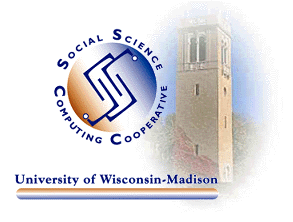
Coping with Computer Viruses
A New Terminal Server
SSCC Fall Training
The SoBig and Blaster computer viruses wreaked havoc as students arrived on campuses and plugged in infected PCs to networks. Many campuses shut down their mail servers (DoIT included) and even entire campus networks as they fought to prevent the further spread of these viruses. We fared much better at SSCC. In addition to handling about 14,000 incoming messages, our mail server blocked over 20,000 viruses on the peak day of the SoBig virus. Fortunately, our mail server was well-equipped to handle the load. It would have been much worse though if we didn't have measures in place like mail server filters that block incoming viruses, a firewall that blocked the Blaster worm, and an automated system of delivering updates and patches to PCs. As it was, we cleaned over 75 PCs (mostly laptops) that were either brought into the building or were not protected because the owners don't log into the PRIMO domain where we send out the updates.
The following advice is worth repeating:
SSCC staff are experimenting with a free software tool called NetReg which
restricts network access to PCs that get plugged into the network for the first
time. NetReg is widely used on college campuses in residential networks (ResNets).
With NetReg, when a new computer is plugged into the network and accesses the
web, it is automatically redirected to an SSCC web site first. Here we can gather
information such as the name of the user and the room number where the computer
is to be used, as well as automatically grabbing a unique identifier for each
computer (the MAC address) and running a simple virus scan for known vulnerabilities
such as the Blaster worm. This way, when there is a problem (either illegitimate
users or infected PCs), we will have a useful tool to track down and solve the
problem. We are in the process of setting up a small isolated network for testing
this software and hope to have it fully implemented in January.
We've added a new terminal server to better accommodate an increasing number
of log ins through the Citrix
ICA client. (The Citrix ICA client is a very convenient tool for connecting
both on campus or remotely via a PC.) The new computer, with two 2.4GHz Xeon
processors (compared to 1GHz processors in the older machines) has been designated
Winstat2. It is ideal for large Windows-based statistical jobs. The former Winstat2
has been reformatted and is now Wincenter3. Recall also that KITE was recently
replaced with a dual processor 2.6GHz Intel Xeon Dell computer. This makes our
top-of-the-line servers significantly faster than the others, but it's still
important to spread the computing load so they don't get bogged down. Unless
you need your results immediately, please continue using Winstat1, our UNIX
servers, and especially Condor.
There is still time to take advantage of SSCC's training offerings this semester. Upcoming classes include "Reading Your Email with Outlook Express" (Oct. 9, 1:30-2:30), "Using Adobe Acrobat Effectively" (Oct. 14, 10:00-11:00), "Running Large Statistical Jobs using Condor" (Oct. 15, 10:00-11:00), "Programming in Stata" (Oct. 16, 10:00-11:15), "Flexible, Reproducible, and Error-Free Research Computing" (Oct. 22, 10:00-11:00), "How to Tune Up Your PC" (Oct. 30, 1:00-2:00), "Introduction to PowerPoint" (Nov. 5, 10:00-11:30), and "Introduction to PC-Pine" (Nov. 12 1:30-2:30). More information including required class registration is on SSCC's training web pages.
Go to previous editions of
SSCC News.
Go to the SSCC Home Page.
© 2003 University of Wisconsin Social Science Computing Cooperative